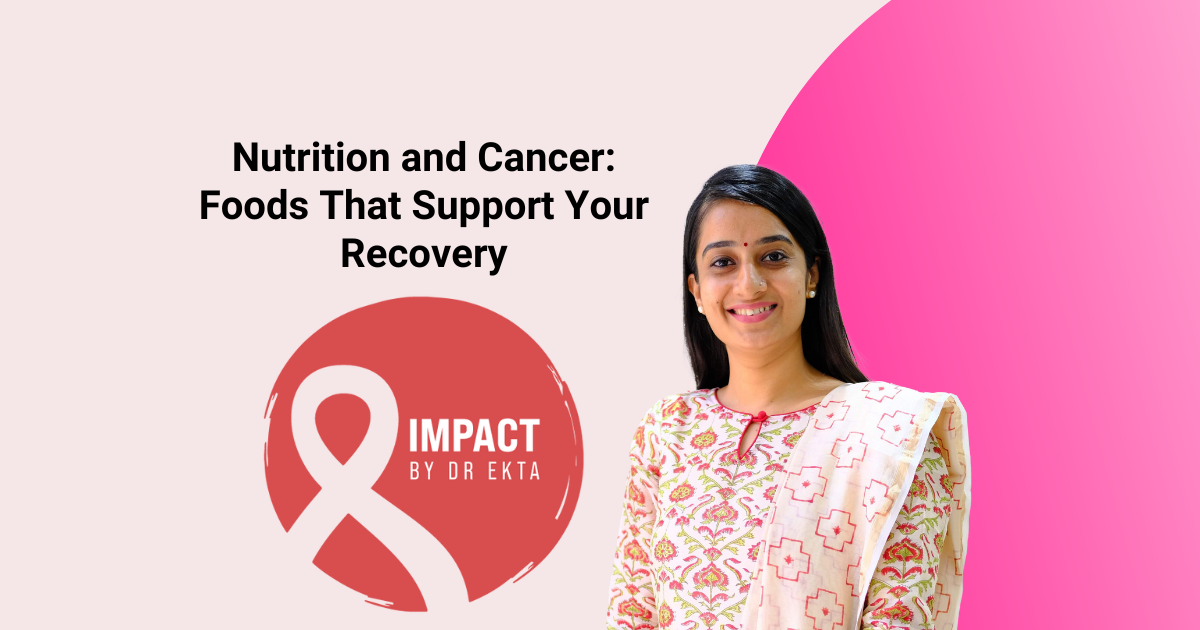Nutrition plays a vital role in every stage of cancer before, during, and after treatment. A balanced diet not only helps you stay strong but also supports your body’s ability to fight disease and recover effectively. In this blog, we’ll explore the powerful link between nutrition and cancer and offer practical dietary tips that help support healing and overall well-being.
The Connection Between Nutrition and Cancer Recovery
A well-balanced diet can help:
- Support immune system function
- Enhance energy levels
- Reduce treatment side effects
- Promote healing and tissue repair
- Improve mental clarity and emotional well-being
Proper nutrition is not a cure, but it is an essential part of a holistic cancer care plan. Consuming nutrient-dense foods can support your body’s resilience during and after treatments like chemotherapy, radiation, or surgery.
Key Nutrients to Focus On During Recovery
Here are some important nutrients and where to find them:
1. Protein
- Helps repair tissues and build strength
- Sources: Eggs, dairy, lean meats, legumes, tofu, nuts, seeds
2. Healthy Fats
- Provide energy and support brain function
- Sources: Avocados, olive oil, fatty fish (salmon, mackerel), flaxseeds
3. Complex Carbohydrates
- Fuel your body with lasting energy
- Sources: Whole grains (brown rice, oats, quinoa), fruits, and vegetables
4. Antioxidants
- Help protect cells from damage
- Sources: Berries, leafy greens, carrots, bell peppers, green tea
5. Fiber
- Supports digestion and reduces inflammation
- Sources: Whole grains, fruits, legumes, nuts, seeds
Cancer-Fighting Foods to Include in Your Diet
Some foods are particularly beneficial during cancer recovery:
- Cruciferous vegetables (broccoli, cauliflower, cabbage): May help reduce cancer growth
- Berries: Rich in antioxidants and vitamin C
- Garlic and onions: Contain compounds with anti-cancer properties
- Tomatoes: High in lycopene, an antioxidant linked to cancer prevention
- Leafy greens (spinach, kale): Packed with vitamins, minerals, and fiber
- Mushrooms: Boost immune function and reduce inflammation
- Whole grains: Provide energy and support digestive health
Hydration Matters
Staying hydrated is just as important as eating well.
- Aim for at least 8-10 glasses of water daily
- Herbal teas and broths are gentle and hydrating
- Avoid sugary drinks and limit caffeine
What to Avoid During Cancer Recovery
Certain foods can hinder your recovery or worsen treatment side effects:
- Processed meats (like sausages and bacon): Linked to increased cancer risk
- Excess sugar: Can cause weight gain and spike blood sugar levels
- Highly processed snacks: Low in nutrients and high in additives
- Alcohol: Can interfere with medications and increase inflammation
If you’re unsure about what to avoid, consult a registered dietitian experienced in cancer care.
Tips for Eating When You Have Low Appetite or Nausea
Side effects from treatment like nausea, loss of appetite, or mouth sores can make eating difficult. Try these tips:
- Eat small, frequent meals throughout the day
- Choose nutrient-rich smoothies or soups
- Keep healthy snacks handy (nuts, yogurt, cheese cubes)
- Try cold or room-temperature foods if smells bother you
- Stay upright after meals to ease digestion
Nutrition and Immune Support
Good nutrition supports the immune system, helping your body fight infections and recover faster.
- Include vitamin C-rich foods (citrus fruits, strawberries, bell peppers)
- Add zinc sources (pumpkin seeds, whole grains, lentils)
- Opt for probiotic-rich foods (yogurt, kefir, fermented vegetables)
Personalized Nutrition: Work with Experts
Every cancer journey is unique, and so are your nutritional needs. A personalized nutrition plan can:
- Address specific treatment side effects
- Help manage weight and energy levels
- Support mental and emotional health
Working with a registered dietitian or oncology nutritionist ensures you get guidance tailored to your diagnosis, treatment, and lifestyle.
Final Thoughts: Let Food Be Your Ally
Nutrition and cancer care go hand-in-hand. By making informed food choices, you support your recovery, strengthen your immune system, and improve your quality of life.
- Choose whole, unprocessed foods whenever possible
- Stay hydrated and listen to your body’s hunger cues
- Don’t hesitate to ask for help from professionals and support groups
Your journey to healing is not just about treatment—it’s about nourishing your body, mind, and spirit every step of the way.
Need help to know more about nutrition plan during treatment! Call us at 8866843843 & connect with your oncologist & nutritionist for expert advice.

